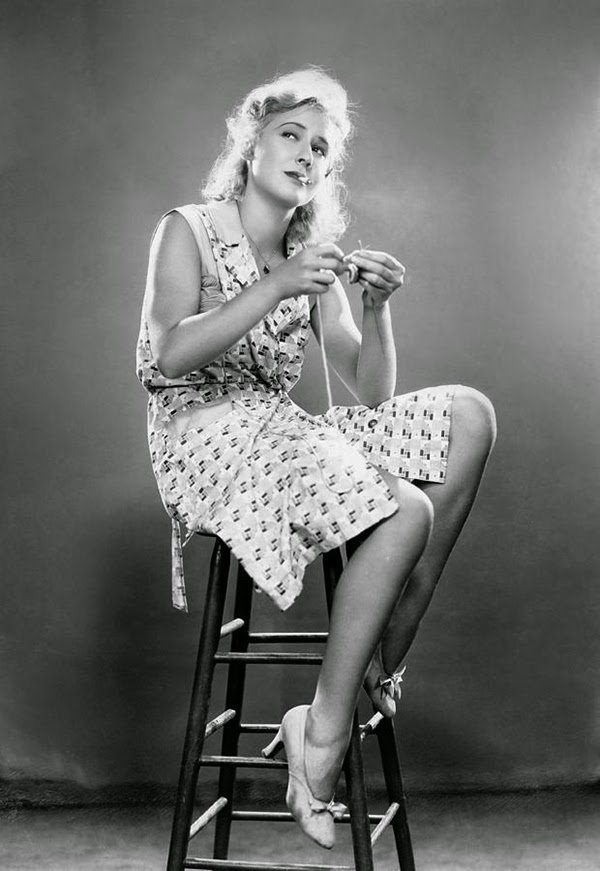
Mae Clarke: An Honest Woman
There is a certain look of wary, contained bitterness that you see on women’s faces in movies from the early thirties. Their eyes become veiled; the women seem to retreat inside themselves defensively, tasting memories of hurt and humiliation, of men who made them feel dirty and how they had to keep on smiling and flirting so they could pay the rent on their drab hall rooms and buy their automat coffee. It’s the look of the chorus girl who has learned to protect herself by shutting down the gates, even while wiggling in her scanties. Barbara Stanwyck carried it throughout her long career, like an eternally livid scar; “bubbly” Joan Blondell wore it quietly; and in Waterloo Bridge (1931) it’s branded on the face of Stanwyck’s one-time roommate, Mae Clarke.
Waterloo Bridge opens with a shorthand summation of a chorus girl’s life. It’s the all-hands-on-deck finale of a fluffy musical revue on the last night of its run. The camera pans past the interchangeable faces of the chorines in their platinum wigs and sparkly tricorn hats, and comes to rest on Mae Clarke, as Myra Deauville. She throws up her arms and gives an open-mouthed laugh, then lapses into exhausted boredom, then switches on the faux exuberance again, then yawns. Throughout the film she keeps doing this: putting on her game “Hello, big boy” act and then flinging it aside with furious disgust. Director James Whale doesn’t bother with transitions, but conveys the whiplashing ups and downs of his heroine’s life through blunt cuts. We see her backstage in her bra, receiving a white fox stole from an admirer; in the next scene, out of work for two years, she’s wearing the stole low around her décolletage, standing outside the theater with a fellow hooker looking for pickups. (The setting is World War I, but when Myra says hopefully, “I’ll get a job soon,” 1931 audiences must have foreseen the worst.)
Spotting a prospective john, the friend primps and smiles flirtatiously, while Myra turns on him with a defiant yet seductive scowl; a sullen, defensive stance that she assumes throughout the film. She suffers from incurable decency, which becomes a scalding torment when she meets an innocent young doughboy who has no idea that she’s a prostitute. She brings Roy (Kent Douglass) to her flat, intending to pluck him for the back rent she needs to satisfy her sour-faced landlady. But it’s too easy: when the sweet, boyish soldier pleads with her to accept the money, she abruptly drops the good-natured frankness she’s been charming him with and turns hard and caustic, hating him because she hates herself for tricking him. She’s so stung with hurt pride that she has to lash out and hurt someone else. Preparing to go out on the streets after sending him away, she stares at her hard face in the mirror, dabbing make-up on the rigid mask that barely conceals the tired, angry sadness beneath.
Waterloo Bridge is the only film that reveals the breadth of Mae Clarke’s talent. In other movies she played nice, open-faced girls or mean, petulant golddiggers. As Myra she is a kaleidoscope of confused emotions. Her best scene comes when Roy tells her he loves her: she turns away, hunched as though against a cold rain, her eyes narrow and tense. This is the final insult from life: for her dream guy to come along too late, when she feels unworthy of him. Leaving, he kisses her hand, and reacting to this tribute she passes through exaltation, anxiety, and rage—growling as she forces herself to cast it aside. She’s too honest to grab the expedient of letting a man make “an honest woman” out of her. But we know she loves him, because in the next scene she’s trying to knit him a pair of socks, sitting at the breakfast table with her hair piled on her head, a cigarette planted in her mouth, mangling the stitches.
The worst is yet to come: well-meaning oblivious Roy tricks her into visiting his posh family in the country. They’re kind and welcoming in that self-satisfied upper-class way bound to cause excruciating discomfort in someone like Myra. Roy’s mother (Enid Bennett) is polite, complacent and deadly. Watching her sweetly confide to Myra that she doesn’t want her son to marry a chorus girl, but that she knows she has nothing to fear from such a “fine” person, is almost unbearably painful. Reduced to abject guilt, Myra confesses her true profession and pitifully sobs, “I just wantcha to know, I could’ve married him…”

